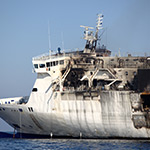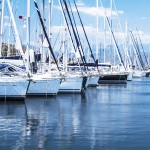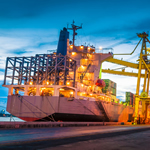
How extreme weather can affect ships over the winter months
When operating a marine vessel in winter, there are always more risks due to the increased likelihood of severe weather and dramatic, often unpredictable, fluctuations in conditions throughout a journey. If travelling is a necessity, boat owners and marine businesses should take no chances as the consequences can be severe should something go amiss.
Navigating choppy waters
In December 2018, a Scotland-bound ferry was hit by severe weather conditions in the North Channel. This caused six lorries and other vehicles to topple against each other and overturn, causing significant damage and crushing cars in the impact.
Fortunately, none of the ferry’s 52 passengers and 56 crew suffered any injuries, however, some were confined to their vehicles during the incident and the impact to the vessel caused widespread panic amongst the passengers.
The incident meant that the port was shut for a long time and customers planning on sailing were encouraged to only travel if absolutely necessary and some journeys were cancelled, meaning that many customers were forced to make alternative arrangements. Suffice to say; multiple journeys and parties were affected in the meantime.
Battling windy conditions
Another incident occurred in the same month when a 16,000-tonne Russian cargo ship ran aground off a beach in Cornwall after speculation that the ship’s anchor broke from the seabed, rendering the crew with no control of the vessel.
The rescue operation was fraught with difficulty due to 60mph winds and rough seas and the ship was grounded for over eight hours.
As the vessel did not have any cargo on board, there were no issues with pollution in this circumstance, yet, if the vehicle had been carrying pollutants this could leave the company vulnerable to investigation by the Environmental Agency (EA). With cargo on board, the boat would have also been subject to theft from modern-day ‘wreckers’, similar to the widescale looting which took place after the Napoli – a 62,000-tonne container ship – was towed into Dorset’s Portland Harbour following catastrophic damage after being caught in a storm.
How can you stay protected?
Whether you own a ferry company, a shipping business or otherwise, in the marine trade you will likely be required to operate in undesirable weather conditions, providing it is within the terms of your policy. Safeguard can ensure that your business is financially protected should you get caught out by extreme weather.
As commercial boat operators, you may have dozens of boats in your care, all of which you have the responsibility to adequately cover in order to protect yourself, your business, your staff, cargo and customers.
The nuances of marine insurance can often make arranging the right policy difficult but with the help of Safeguard’s specialists, you can ensure that you have sufficient insurance in place to keep your marine business protected. We will also make you aware of any exclusions your policy may stipulate so you do not get caught out by taking risks which may void your cover.
Fancy taking the plunge?
We are offering a guaranteed reduction of 15% off your current insurance* for all new marine customers, subject to a copy of your schedule and terms and conditions from your providers.
Get in touch on 01322 337557 or contact Safeguard’s Director Stewart on 07956 490 452.
*Subject to terms and conditions




